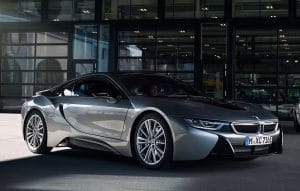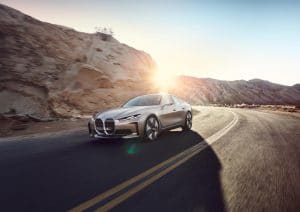
BMW is ending the six-year run of its i8 PHEV sports coupe to allow the Leipzig plant to focus on electric vehicles.
BMW will end production of the i8 plug-in hybrid sports car next month after a six-year run.
When BMW launched the i8 in 2014, it consciously countered what was then the conventional wisdom about hybrid-electric vehicles. True, the car got solid fuel economy, but it also delivered stellar performance.
The Bavarian automaker had been producing the PHEV sports car at its Leipzig assembly plant. Going forward, the factory will focus on all-electric products like the iNext, i4 and iX3 – the first all-new all-electric models BMW has launched since mid-decade when it brought the i3 city car to market.
(BMW plugs back in with long-delayed i4 concept.)
BMW isn’t giving up on plug-in hybrids, however. If anything, its strategy towards electrification has shifted substantially since it first unveiled its BMW i brand nearly a decade ago. Going forward, while there will be some dedicated all-electric product lines, BMW plans to offer most of it models with a choice of powertrain technologies, ranging from conventional gas and diesel all the way up to pure battery drive.
First unveiled in 2011 at the Frankfurt Motor Show as a turbodiesel-hybrid concept vehicle, the launch of the production BMW i8 generated plenty of buzz, albeit with relatively modest sales. The numbers were clearly influenced by the sports car’s hefty price tag – which today starts at $147,500 in the U.S. All told, the automaker has produced only slightly more than 20,000 i8s, including both the original coupe, as well as the open-topped Roadster version it added in 2017.
At the time of its launch, BMW was a clear pioneer in electrified vehicle technology – and was willing to run counter to conventional wisdom. Back then, hybrids were largely being modeled after the Toyota Prius, putting the emphasis on fuel efficiency above all else. While the i8 also adopted an exotic design meant to maximize aerodynamics, its plug-in drivetrain put a premium, as much as anything, on performance.
Today, striking a balance between energy efficiency and performance is quickly becoming the norm for hybrids, PHEV and pure battery-electric vehicles – everything from the new Honda CR-V Hybrid to the Porsche Taycan.
(First Drive: 2020 BMW M340i xDrive.)
The i8’s pint-sized 3-cylinder turbo gas engine, paired with twin electric motors, punched out an impressive 357 horsepower and 420 pound-feet of torque, enough to launch the sports car from 0 to 60 in barely 4 seconds. BMW has changed relatively little since the introduction of the i8, beyond adding the Roadster and adding another 12 hp in 2018.
The i8 – and the smaller, all-electric i3 – have had a significant impact on BMW’s future plans, and not just from a powertrain perspective. Cutting mass is one of the key ways to improve a vehicle’s fuel efficiency – and range, in the case of anything running on batteries. That led BMW to focus on ultra-light and super-strong carbon fiber. That material has now begun showing up in a wide range of the automaker’s products, notably including the Carbon Core platform of the latest-generation 7-Series.
BMW wants the i8 to go out with at least a bit of a bang and says it will finish up the six-year run with the Ultimate Sophisto Edition of which just 200 copies will be produced.
While the i8 is going away, there have been signals that a replacement may yet follow. One possibility is a production version of the Vision M Next concept that was unveiled last year. Other possibilities include a design closer to that of the upcoming Tesla Roadster. BMW officials appear to be weighing whether to go for another PHEV or an all-electric design like the Tesla and Audi’s upcoming e-tron GT.
(All BMW models to be electric by 2030.)
If it does go all-electric, BMW may very well borrow inspiration from the race car it currently is fielding in the global Formula E series.



